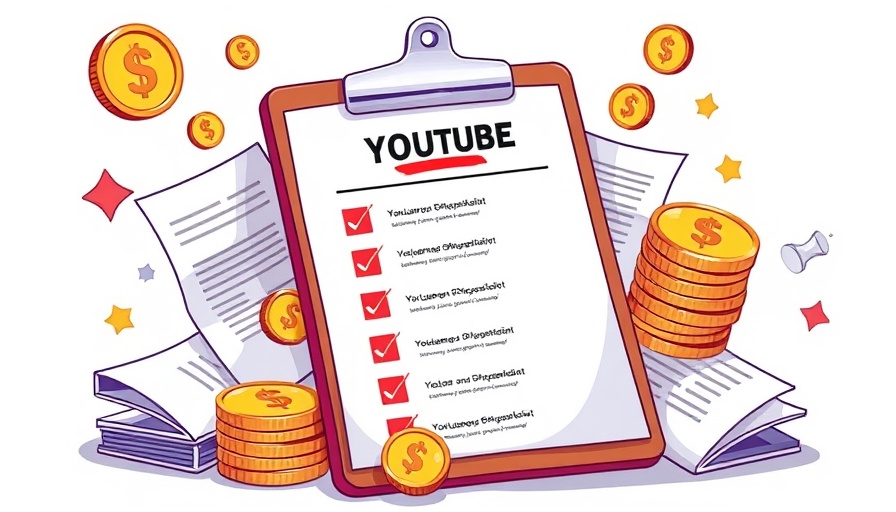
YouTube's New Monetization Landscape: Understanding the Shift
YouTube has long been a cornerstone for content creators leveraging the platform for marketing and income through ad revenue. However, a recent shift in the monetization policies has ignited conversations about its implications beyond mere ad revenue. Many creators fear that this change might undermine their income, but it's essential to delve deeper into the reasoning behind these adjustments and what they potentially mean for the future of digital content.
The Shift from Ad Revenue Focus
The recent monetization changes signify a broadening of YouTube's strategy regarding revenue generation. While ad revenue has been the primary income stream for many creators, YouTube appears to be steering towards diversified monetization avenues. This shift emphasizes the importance of content quality and audience engagement over simply accruing views and clicks. For businesses and marketers using YouTube as a tool in their digital marketing strategies, understanding these changes is crucial.
Understanding Viewer Engagement in Monetization
Viewer engagement plays a pivotal role in the new monetization landscape. YouTube's shift may reflect a growing emphasis on high-quality content that drives meaningful viewer interactions rather than high traffic with low engagement. This trend highlights the growing significance of factors like audience retention rates, watch times, and interaction metrics, which can all impact how revenue is generated on the platform.
Analytical Insights: Implications for Brands and Marketers
As brands and content creators navigate this new environment, leveraging advanced analytics will become more essential than ever. Understanding your audience—who they are, what they like, and how they engage with your content—can directly influence your success on the platform. In an age where SEO updates are crucial, brands should focus on data-driven marketing strategies that optimize viewer engagement and retention, paving the way for successful monetization.
The Role of Influencer Marketing in the New Era
The changes in YouTube's monetization policy also spotlight the role of influencer marketing. Brands are increasingly looking to partner with influential creators who can engage audiences authentically. This trend can amplify brand awareness and foster genuine connections with potential customers, thus enhancing the overall consumer experience. Leveraging YouTube SEO strategies becomes paramount for brands aiming to increase visibility and engagement through these collaborations.
Practical Insights for Content Strategy Development
To adapt to these shifts, marketers and content creators should focus on developing a flexible content strategy. This means not only producing high-quality video content but also ensuring consistency in sharing and interacting with audiences. Content marketing strategies that include storytelling, authenticity, and innovation can facilitate deeper connections with viewers and enhance brand loyalty.
Future Predictions: What Lies Ahead for YouTube Monetization
Looking ahead, the evolution of YouTube’s monetization policies may lean towards even more innovative measures. With trends indicating a shift towards AI integration and enhanced analytics tools, future content creators and brands must prepare to adapt quickly. Campaign analysis will become vital as the competitive landscape intensifies, requiring marketers to focus on adapting their strategies in real-time to maintain relevance and effectiveness.
Conclusion: Time for Strategy Reevaluation
As YouTube evolves, it’s essential for marketers and business owners to rethink their approaches to content creation and monetization. Understanding the motives behind these changes can lead to innovative strategies within digital marketing. Embrace this evolution as an opportunity to refine your digital marketing tactics, enhance customer engagement, and ultimately drive better results. The time to reevaluate your marketing strategy is now, as adapting quickly to these trends will determine long-term success on platforms such as YouTube.
 Add Row
Add Row  Add
Add 




Write A Comment